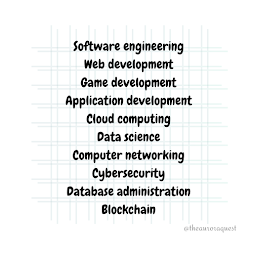Why Computer Science
Engineering became a major part of our day-to-day life?
So what are the
sub-branches that CS deals with?
Skills you need to have a grip on..
- problem-solving skills
- creative and logical thinking
- analytical skills
- and have the ability to grasp the latest tech knowledge quickly.
With this skillset
added to your passion, you can excel in this field of technology. CS deals with
theoretical foundations and practical techniques for the implementation and
application in computer systems leading you to the world of everything bits and
bytes.
Okay! So, having a degree is a must?
NO, YOUR DEGREE DOES
NOT DETERMINE YOUR CAREER. BUT IT DOES POINT YOU IN CERTAIN DIRECTION…
Here is a quick sneak
peek of what streams you can choose with CS :
1. Software
engineering:
It focuses on
the systems and protocols for any applications, which need software to support
the work they do. Software engineering is a lucrative career choice for those
who enjoy creative and logical problem-solving. The basic work many software
engineers do include designing, coding, testing, and deploying software
solutions. All these are based on user-specific needs without any fault in
performance. This field encompasses a wide range of professional topics and
skills.
2. Web development:
Generally, web development refers to the building or developing and deploying websites for hosting via the internet.
Where we need a solid grasp of designing, web content development, client-side
or server-side scripting, network security configuration, backing up the files,
updates, and operations required to maintain a website to ensure its
performance, etc.. to work in this field.
3. Game development:
It is the art of creating video games.
Game development involves the stages like concept generation, designing,
developing, testing the prototype, and deploying the product - the final GAME.
It is vital to think about game mechanics, player engagement, and level design
while creating a game.
4. Application
development:
An APP is the slang
term we commonly use for a software application that runs on a device to
complete a task easily and efficiently. Application software is developed
differently for various platforms. For example, in mobile apps, the two popular
platforms are IOS and ANDROID.
5. Cloud computing:
Cloud computing technology is an
internet-driven platform for storing and managing data on remote servers. It is
used for the people and businesses for many reasons like cost savings,
increased productivity, speed performance, efficiency, and security.
6. Data science:
Data Science uses scientific methods,
techniques, algorithms, and systems to extract knowledge and useful insights
from many structural and unstructured data. Data science is evolving fast and
has a wide range of possibilities surrounding it.
7. Computer
networking:
It aims to study
and analyze the communication process among various computing devices that are
linked or networked together to exchange data info and share resources.
Computer networking responsibilities include managing bandwidth, traffic, user access, and the
security of networks, etc.built with a combination of hardware and software.
8. Cybersecurity:
Cybersecurity is the application of
technology that can prevent cyber threats like attacks, unauthorized access to
data, programs, and networks of our digital assets. It consists of techniques
related to protecting computers, networks, programs, and data from attacks to
prevent any exploitation.
9. Database
administration:
It refers to
managing and maintaining database management systems software. Data
administration includes a set of activities like database security, monitoring,
troubleshooting, and arrangement planning for a future basis.
10. Blockchain:
Blockchain is a system of decentralized
digital lists or ledgers, containing records referred to as blocks, which hold
information in a secure, transparent, and permanent peer to peer network, with
the significant difference that one organization governs the network by
controlling the allowance to participate in the network, execute a consensus
protocol and maintain the shared ledger.
Wondering why there are only ten listed above?
Well, there are
hundreds of domains and sub-domains in CS and we will be here reading all-day
long if we choose to.
So, if you think you
are still unclear, no worries. In the above ten domains, there are several
sub-domains. Let us consider the case of DBMS - you can be a Data Analyst or a
Data Warehouse Specialist or a Database Administrator. In the end, it is what
motivates you more, and ignites passion in you should be your career path.


